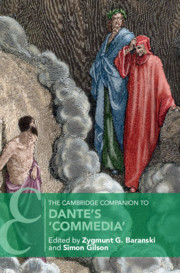Book contents
- The Cambridge Companion to Dante’s Commedia
- The Cambridge Companion to Dante’s Commedia
- Copyright page
- Dedication
- Contents
- Illustrations
- Map
- Contributors
- Abbreviations and note on translations
- Chronology 1250–1340
- Map
- Figures
- Introduction
- 1 Narrative Structure
- 2 Dante Alighieri, Dante-poet, Dante-character
- 3 Characterization
- 4 Moral Structure
- 5 Title, Genre, Metaliterary Aspects
- 6 Language and Style
- 7 Allegories of the Corpus
- 8 Classical Culture
- 9 Vernacular Literature and Culture
- 10 Religious Culture
- 11 Doctrine
- 12 Politics
- 13 Genesis, Dating, and Dante’s ‘Other Works’
- 14 Transmission History
- 15 Early Reception until 1481
- 16 Later Reception from 1481 to the Present
- Further Reading
- General Index
- Index Of References To Dante’s Works
5 - Title, Genre, Metaliterary Aspects
Published online by Cambridge University Press: 07 December 2018
- The Cambridge Companion to Dante’s Commedia
- The Cambridge Companion to Dante’s Commedia
- Copyright page
- Dedication
- Contents
- Illustrations
- Map
- Contributors
- Abbreviations and note on translations
- Chronology 1250–1340
- Map
- Figures
- Introduction
- 1 Narrative Structure
- 2 Dante Alighieri, Dante-poet, Dante-character
- 3 Characterization
- 4 Moral Structure
- 5 Title, Genre, Metaliterary Aspects
- 6 Language and Style
- 7 Allegories of the Corpus
- 8 Classical Culture
- 9 Vernacular Literature and Culture
- 10 Religious Culture
- 11 Doctrine
- 12 Politics
- 13 Genesis, Dating, and Dante’s ‘Other Works’
- 14 Transmission History
- 15 Early Reception until 1481
- 16 Later Reception from 1481 to the Present
- Further Reading
- General Index
- Index Of References To Dante’s Works
Summary
- Type
- Chapter
- Information
- The Cambridge Companion to Dante's ‘Commedia' , pp. 79 - 94Publisher: Cambridge University PressPrint publication year: 2018



